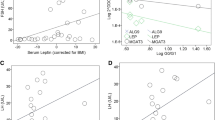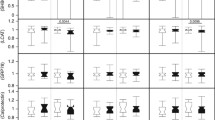Abstract
Objective: Previous studies have suggested that high levels of galactose consumption and/or low levels of galactose-1-phosphate uridyl transferase (GALT) activity may result in an increased risk of epithelial ovarian cancer. Similarly, some have reported that carriers of the N314D (asparagine at codon 314 replaced by aspartate) GALT polymorphism, which can be associated with low GALT activity, may have a higher risk of ovarian cancer. We examined these issues as part of a large case–control study of ovarian cancer conducted in Los Angeles between 1992 and 1998. Methods: A total of 1439 histologically confirmed borderline and invasive ovarian cancer cases among English-speaking non-Asian women were ascertained through the population-based cancer registry for Los Angeles County and completed in-person interviews were obtained from 689 of these (78% of cases approached). Controls consisted of 645 English-speaking non-Asian women with at least one intact ovary matched to cases on race/ethnicity (African-American, Latina, non-Latina White), date of birth (±3 years), and neighborhood of residence. Interviewer-administered questionnaires included information on reproductive factors, exogenous hormone use, medical history, and diet. Dietary information for the year before each case's diagnosis (and the same period for her matched control) was obtained using a self-administered food-frequency questionnaire. Blood samples were obtained from 452 controls, 136 cases with borderline ovarian cancer, and 312 cases with invasive ovarian cancer. The N314D polymorphism was characterized using PCR-RFLP and GALT enzyme activity, and was determined for a sample of the subjects with GALT genotype using an erythrocyte-based radioactive enzyme assay. Results: We found no effect of N314D GALT genotype on the risk of borderline ovarian cancer (odds ratio (OR) = 0.91; 95% confidence interval (CI) = 0.54–1.6) or invasive ovarian cancer (OR = 0.78; 95% CI & equals; 0.53–1.2). Neither did we observe a relationship between GALT activity or lactose/galactose intake and risk of borderline or invasive ovarian cancer. Among N314D carriers, galactose consumption was associated with an increased risk of borderline (OR = 2.7, p = 0.01), but not invasive (OR = 1.2, p = 0.34), ovarian cancer; however, this result was based on only 24 N314D-positive borderline cases. Conclusions: Differences in galactose intake and GALT metabolism do not contribute significantly to the risk of ovarian cancer. There is some evidence that galactose intake may play a role in the development of borderline ovarian cancer among women who carry the uncommon GALT N314D polymorphism. More data are needed if this latter suggestion is to be definitively addressed.
Similar content being viewed by others
References
Cramer DW, Welch WR, Hutchinson GB, Willett W, Scully RE (1984) Dietary animal fat in relation to ovarian cancer risk. Obstet Gynecol 63: 833–838.
Cramer DW, Willett WC, Bell DA, et al. (1989) Galactose consumption and metabolism in relation to the risk of ovarian cancer. Lancet 2: 66–71.
Cramer DW, Muto MG, Reichardt JKV, et al. (1994) Characteristics of women with a family history of ovarian cancer. 1: Galactose consumption and metabolism. Cancer 74: 1309–1317.
Cramer DW, Greenberg ER, Titus-Ernstoff L, et al. (2000) A case-control study of galactose consumption and metabolism in relation to ovarian cancer. Cancer Epidemiol Biomarkers Prev 9: 95–101.
Harlow BL, Cramer DW, Geller J (1991) The influence of lactose consumption on the association of oral contraceptive use and ovarian cancer risk. Am J Epidemiol 134: 445–453.
Xu Y-K, Ng WG, Kaufman FR, Lobo RA, Donnell GN (1989) Galactose metabolism in human ovarian tissue. Pediatr Res 25: 151–155.
Chen Y-T, Mattison DR, Feigenbaum L (1981) Reduction in oocyte number following prenatal exposure to a diet high in galactose. Science 214: 1145–1147.
Kaufman FR, Kogut MD, Donnell GN, Goebelsmann U, March C, Kock R (1981) Hypergonadotropic hypogonadism in female patients with galactosemia. N Engl J Med 304: 994–998.
Kaufman FR, Xu YK, Ng WG, Donnell GN (1988). Correlation of ovarian function with galactose-1–phosphate uridyl transferase levels in galactosemia. J Pediatr 112: 754–756.
Stram DO, Hankin JH, Wilkens LR, et al. (2000) Calibration of the dietary questionnaire for a multiethnic cohort in Hawaii and Los Angeles. Am J Epidemiol 151: 358–370.
Lin CH, Kirby LT, Ng WG, Reichardt JKV (1994) On the molecular nature of the Duarte variant of galactose-1–phosphate uridyl transferase (GALT). Hum Genet 93: 167–169.
Lee JES, Ng WG (1982) Semi-micro techniques for the genotyping of galactokinase and galactose-1–phosphate uridyltransferase. Clin Chim Acta 124: 351–356.
Liu L, Deapen D, Bernstein L (1998) Socioeconomic status and cancers of the female breast and reproductive organs: a comparison across racial/ethnic populations in Los Angeles County, California (United States). Cancer Causes Control 9: 369–380.
Ng WG, Bergren WR, Donnell GN (1973) A new variant of galactose-1–phosphate uridyltransferase in man: the Los Angeles variant. Ann Hum Genet 37: 1–8.
Waldinger R, Lichter M. Anglos (1996) Beyond ethnicity? In: Waldinger R, Bozorgmehr M, eds. Ethnic Los Angeles, New York: Russell Sage, pp. 413–444.
Risch HA, Jain M, Marrett LD, Howe GR (1994) Dietary lactose intake, lactose intolerance, and the risk of epithelial ovarian cancer in southern Ontario (Canada). Cancer Causes Control 5: 540–548.
Herrinton LJ, Weiss NS, Beresford SAA, et al. (1995) Lactose and galactose intake and metabolism in relation to the risk of epithelial ovarian-cancer. Am J Epidemiol 141: 407–416.
Webb PM, Bain CJ, Purdie DM, Harvey PWJ, Green A (1998) Milk consumption, galactose metabolism and ovarian cancer (Australia). Cancer Causes Control 9: 637–644.
Mettlin CJ, Piver MS (1990) A case-control study of milk-drinking and ovarian cancer risk. Am J Epidemiol 132: 871–876.
Morland SJ, Jiang X, Hitchcock A, Thomas EJ, Campbell IG (1998) Mutation of galactose-1–phosphate uridyl transferase and its association with ovarian cancer and endometriosis. Int J Cancer 77: 825–827.
McCluskey LL, Dubeau L (1997) Biology of ovarian cancer. Curr Opin Oncol 9: 465–470.
Author information
Authors and Affiliations
Rights and permissions
About this article
Cite this article
Cozen, W., Peters, R., Reichardt, J.K. et al. Galactose-1-phosphate uridyl transferase (GALT) genotype and phenotype, galactose consumption, and the risk of borderline and invasive ovarian cancer (United States). Cancer Causes Control 13, 113–120 (2002). https://doi.org/10.1023/A:1014384027523
Issue Date:
DOI: https://doi.org/10.1023/A:1014384027523




